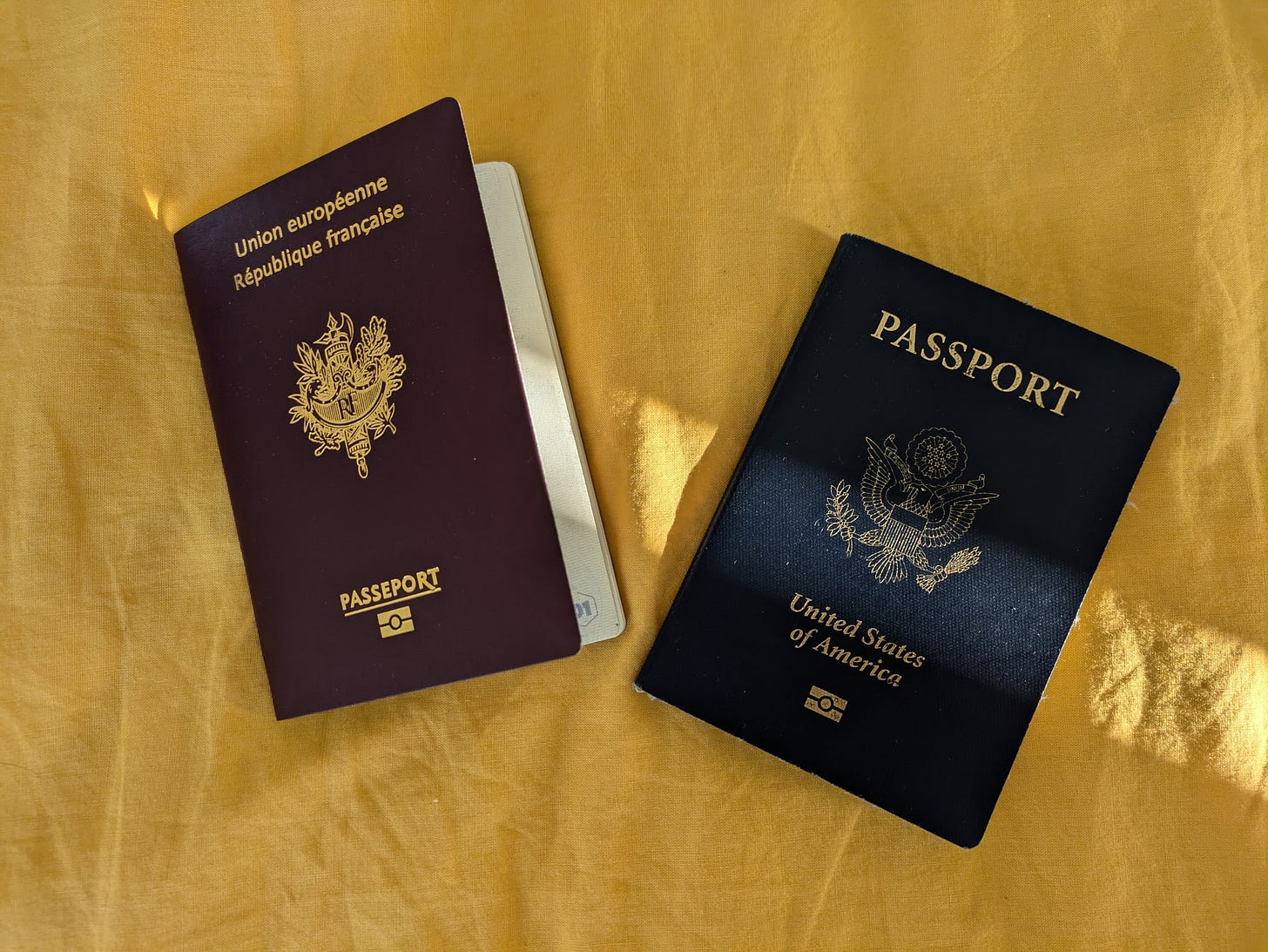Bi-nationality takes center stage in French snap elections
The far-right casts doubt on the trustworthiness of people with two passports
I know I’m not the target. I have two passports: French and American. If I were French-Algerian, French-Moroccan or French-Congolese, I might be more scared. Still, it stings a bit to hear that under a far-right Rassemblement National (RN) government, I’d be considered, in some way, lesser: possibly barred access from certain types of jobs, not trusted to represent the country in a public capacity, only half-committed to being French.
This past week the term “les binationaux” has been on the tip of everyone’s tongues. On Monday, Jordan Bardella, France’s future possible far-right Prime Minister, claimed that people with two or more nationalities could be barred from certain “strategic” positions in government — slightly walking back prior statements (and policy proposals from his party).
In Tuesday night’s televised debate, Bardella doubled down, suggesting that the restrictions on binationals would only affect a small amount of people, but that nonetheless, we wouldn’t want a French-Russian in charge of the nuclear codes, would we? This led to an awkward moment in which Macron’s former prime minister Gabriel Attal called out Bardella’s own party for naming a French-Russian to a European Parliament foreign affairs commission.
But, as Libé writes, there is more than rhetoric at play here. The RN has promised a referendum on immigration — something that Macron’s party might agree to, seeing as its stance on immigration has increasingly aped that of the far-right and, as in the US, Macron wants to appear “strong” on immigration to appease his more conservative voter base. In 2022, the RN proposed a constitutional amendment that would ban bi-nationals not just from top national security posts, but from a wide variety of public functions, such as administrative or functionary posts. Although unlikely to get passed into law, this restriction would apply to the roughly 3.5 million French people who have at least two nationalities — a great many of whom work in public administration.
Jean-Yves Camus, an expert on the far-right at the think tank Fondation Jean Jaurès, told me in a recent phone call that restricting the liberties of some bi-nationals would involve amending the constitution, an improbable but not impossible feat. “It would be utterly crazy” to try to do so, he said.
Camus, who has studied the normalization of the far-right for more than two decades, explained that safeguards are already in place to prevent foreign interference, rendering Bardella’s proposal to limit access to sensitive posts obsolete. Furthermore, he added, some bi-nationals — such as Algerians — come from countries that do not allow citizens to renounce their birth citizenship, meaning that asked to choose between French and another nationality would be impossible for them.
More so than an attempt to change policy, then, the RN’s strategy here is to injure, to demonize, to divide. Bardella hopes to call into doubt the faithfulness of bi-nationals by making the distinction between “pure” and “on paper” French — a dangerous dichotomy that harkens back to the 1930s and Charles Maurras, the founding philosopher of the monarchist, anti-semitic Action Française movement.
So much was made clear by French-Moroccan Najat Vallaud-Belkacem, France’s former Minister of Education, after a member of Bardella’s party decried that positions in French government should be reserved for “franco-français,” or “French French.” “It’s a disloyalty trial that is being carried out,” Vallaud-Belkacem responded.
On Sunday, French voters (bi-national and otherwise) will vote in the first-round of snap parliamentary elections. The far-right is currently polling at about 30 percent, significantly above the “glass ceiling” of 20 percent that Camus and his colleagues fixed in 2002 after Jean-Marie Le Pen — the founder of the Front National, who in 1985 said that bi-nationals should have to choose between, for example, being Algerian or being French — won 10 percent in national elections.
Whether or not the far-right get a majority in the national assembly depends largely on how many young people come out to vote this weekend and the following. So far the signs are somewhat encouraging: 2 million people have already signed up to vote by procuration (via another person) and pollsters expect higher than 60 percent turnout, versus under 50 percent for the June 9 European elections.
As a bi-national, and a recent French citizen, I’ll be casting my second vote in as many months, and I’ll be voting to “faire barrage,” or “block” the far-right. And while I’m slightly concerned for my own situation under a far-right government, I’m much more frightened for people in more precarious situations than myself: undocumented migrants, single immigrant mothers, students.
It’s something Camus, at the Fondation Jean-Jaurès, agreed with.
“It's the closure of France to all non-European immigration, it's sending them back to their country of origin,” he said of the RN’s policy on immigration. “Bardella has just said it again: foreigners who, after six months of stay in France, have not found a job, or foreigners who are delinquents or who have served their sentence and are leaving prison” will be forced out of the country.
Something that seems less likely to be walked back.




